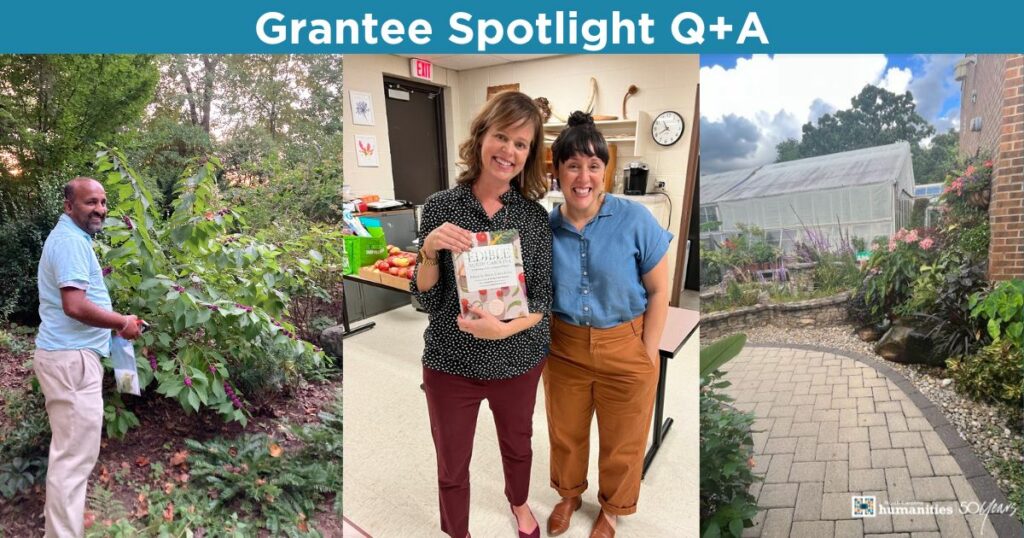Grantee Spotlight: A Q+A with UNC Charlotte’s Carolina Garden Trail
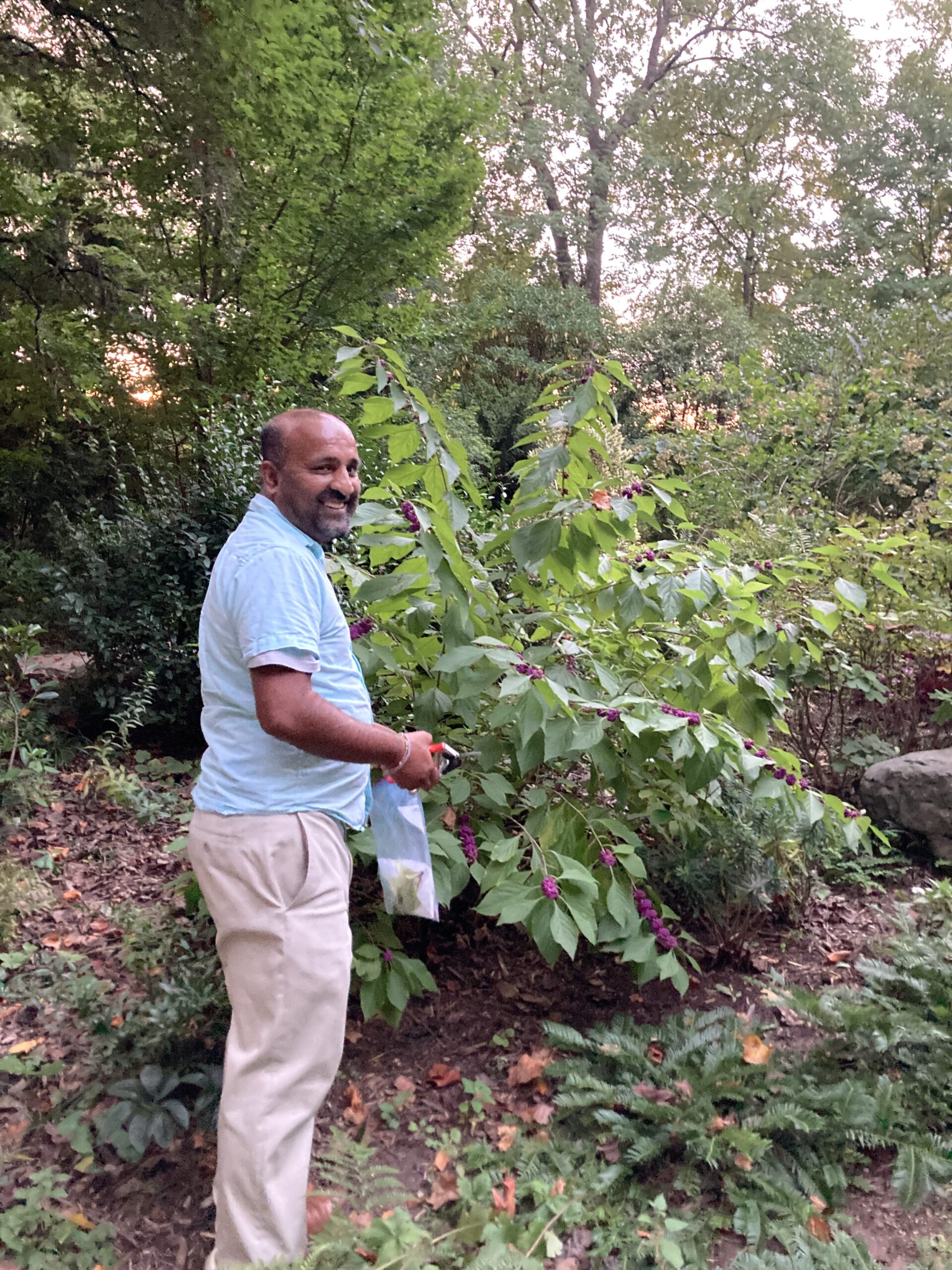 Something is growing at UNC Charlotte. Not just plants, but conversation.
Something is growing at UNC Charlotte. Not just plants, but conversation.
“Foodways” is a term sometimes used to describe how we talk about what we eat, why we eat and cook with certain foods, and why it matters. A team composed of University of North Carolina (UNC) Charlotte’s Center for the Study of the New South, Botanical Gardens, and Urban Institute are taking that concept one step further at the Carolina Garden Trail, located at UNC Charlotte’s Botanical Garden.
In 2019 the team received a Large Grant from North Carolina Humanities to develop an immersive horticulture experience to help tell the story of North Carolina through plants and crops. The Trail provides a universal language, allowing people from varying ages and backgrounds to gain knowledge about their shared histories. The Carolina Garden Trail is free for visitors and encourages guests to consider how plants have been used in differing – and similar – ways by people of diverse cultures, generations, and geographies.
We connected with Ashli Stokes, professor of communication studies at UNC Charlotte and project director of the Carolina Garden Trail, to learn more about how plants and food are a gateway to understanding, empathy, and conversation.
Where did the idea of blending humanities storytelling with horticulture come from?
Ashli: Jeff Gillman, the director of our botanical garden, and I had a lot of conversations when we were first developing this idea. Jeff is very well versed in how crops have evolved over time. For example, he knows how, something like okra, moved from West Africa through the transatlantic slave trade into the Carolinas and how eventually that okra adapted into new varieties. Clemson Spineless is a prominent type of okra that’s specific to our region, and you can see it in the garden. I helped translate that history into a cultural context and help apply it to conversations about race, social class, gender, and more, that we can have today. So, for example, okra gives us a way to talk about African Americans-contributions to Carolina’s foods and crops and to share stories of who has cooked with it and why. This layered approach is helpful in building a different, broader understanding of our history through plants.
What can people expect to see when they visit Carolina Garden Trail?
Ashli: The garden is divided into six different areas representing time periods of history, starting from Indigenous crops through present day. The Garden is not a flat square, but a winding trail that moves down through the landscape. That was very intentional, not only because of the growing conditions, but we really wanted visitors to have an immersive experience like they are moving through time. Students at the university helped us decide what to plant in the garden. Students in our food and communication course made the argument for why certain plants should be showcased based on cultural identity, historical context, and use. When you visit the garden now, some of the copy that you’ll read on the signs was written directly by our students. The garden is free and open to the public and will change and be enhanced with the seasons. Over time what you’ll see is the maturation of plants. This last July it was amazing to see how vibrant and beautiful the initial crops could be. Then, in the fall, we harvested things! In August we harvested okra and made gumbo for the garden staff to try.
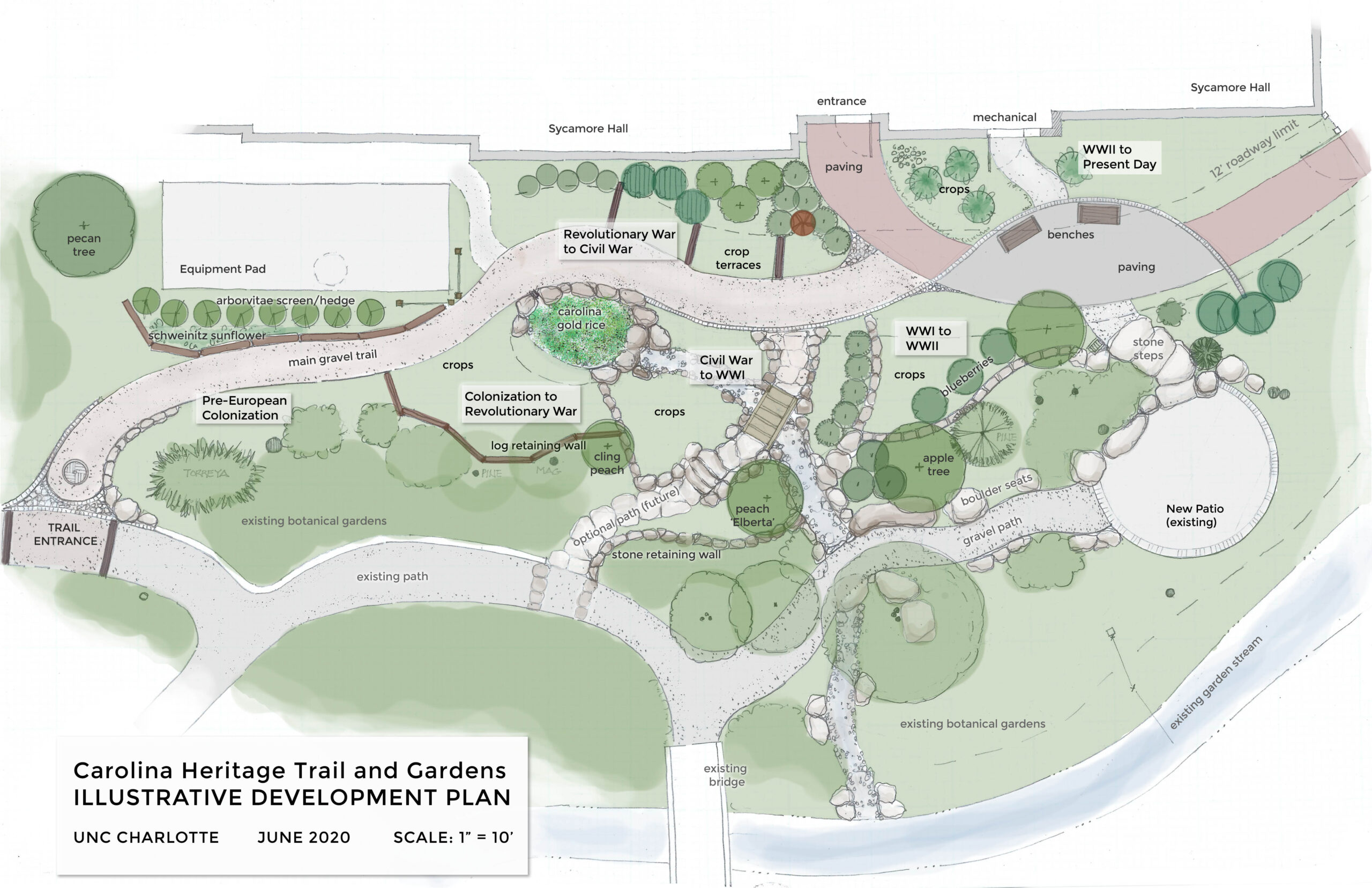
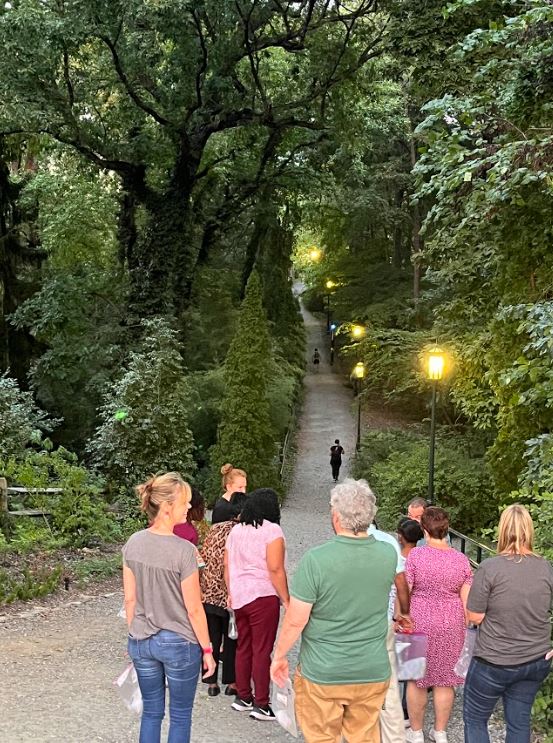 How does food showcase our cultural values?
How does food showcase our cultural values?
Ashli: Crops showcase our cultural values; they can share a rhetorical or persuasive message. Let’s use corn, which can turn into cornbread, as an example. Several scholars talk about how back in the late 19th century, we had reformers who came to the south and said, “Don’t cook with that corn meal. It is of lower value, it is unhygienic, it is rough and rustic, and instead you should use white flour to make biscuits.” At that time, cornbread was associated with a lower socio-economic class and uneducated type of North Carolinian or Southerner. Today however, it’s an American darling! You can use cornbread as an example to see how food popularity changes over time and how we think about Southern identity. When we talk about sugar and cornbread the conversation gets even more interesting. There are some people in the South that say you must never put sugar in “real” cornbread, but it begs the question: why and who gets to decide? Historically we see that when many African Americans moved north during the Great Migration, they had to use yellow corn meal, which is less sweet than the white corn meal that was more readily available in the south. So, when we talk about sweet vs unsweet cornbread, we’re really talking about race and class.
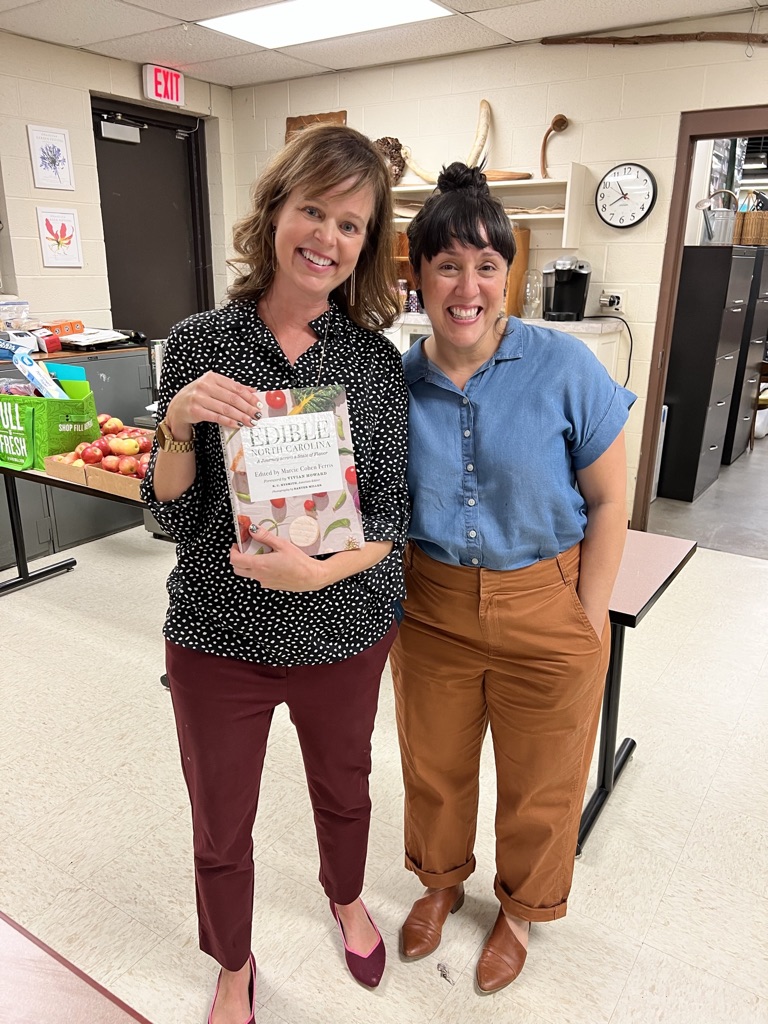 What is something you think the Carolina Garden Trail helps people understand?
What is something you think the Carolina Garden Trail helps people understand?
Ashli: We want visitors to learn how food can be an expression of our identities, both individually and as a region, state, and nation. Public discourse about political and social issues has gotten really heated and divisive recently. Food is certainly not a cure-all, but if you’re in a garden, if you’re tasting food, if you’re having these experiences, maybe it helps you appreciate the multitude of North Carolinians that we have in the state and the histories that have made us who we are. We really want to complicate that narrative, and I think that food is an approachable way to do that.
How is the garden being used by teachers and students?
Ashli: Recently we had a group of Charlotte Mecklenburg teachers come use the garden to design curricula for their classes. We had teachers attend who taught fourth grade all the way up to high school. We had one teacher who is talking about bodily systems and teaching those through the foods that are in our garden. We had another teacher who plans to connect corn in the Carolinas to corn use in different cultures for their students in AP Spanish. We would love to be a resource for other North Carolina school systems. One of our goals for the future is to develop curricula for fourth graders. Students in North Carolina learn about Carolina’s history in fourth grade, so we feel that we have an opportunity to get plants and crops into that discussion. We’d love to have kids more come visit us as well!
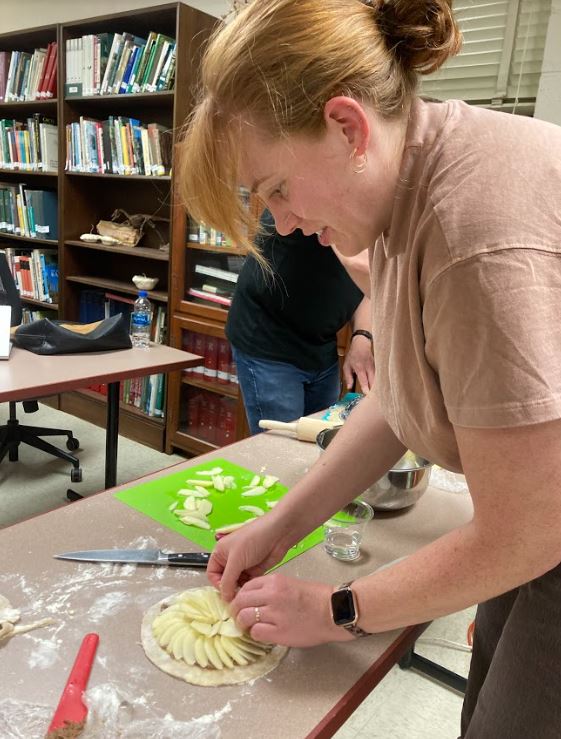 What did funding from North Carolina Humanities allow you to do?
What did funding from North Carolina Humanities allow you to do?
Ashli: This is still a kind of “pinch me” scenario in the sense that when you tell a granting organization, “Hey, I want to build a garden to tell the story of the state through food,” some people would say, “Wait, what?” but North Carolina Humanities was different. We would not have been able to do this without NC Humanities. I feel like it’s a partnership. This project was impacted by COVID; we couldn’t get supplies, we couldn’t plant, we could not physically get on campus to design the garden for a while, but NC Humanities was understanding and worked with us until we were able to make it happen. We also hosted several classes and lectures with African American culinary historians and chefs who talked about how fundamental the African American emphasis is in North Carolina and southern cuisine. We also had a cooking demo where Keia Mastrianni, who is a baker out of Shelby, NC, came and taught us to cook with North Carolina apples. We made an apple galette right before Thanksgiving and learned about the different types of North Carolina flour and apples, who made this dish first, and why that matters. It was amazing. I feel strongly about the importance of humanities funding. I hope that we continue to be in a political climate where this funding is something that is supported because, now more than ever, we need ways to talk about big issues.
How can people support The Carolina Garden Trail?
Ashli: Please come visit! If you call UNC Charlotte’s Botanical Garden, they will give you a personal tour of the Trail. You can also help us spread the word about this great community resource. We’d appreciate that. We also accept donations, which can be made online.
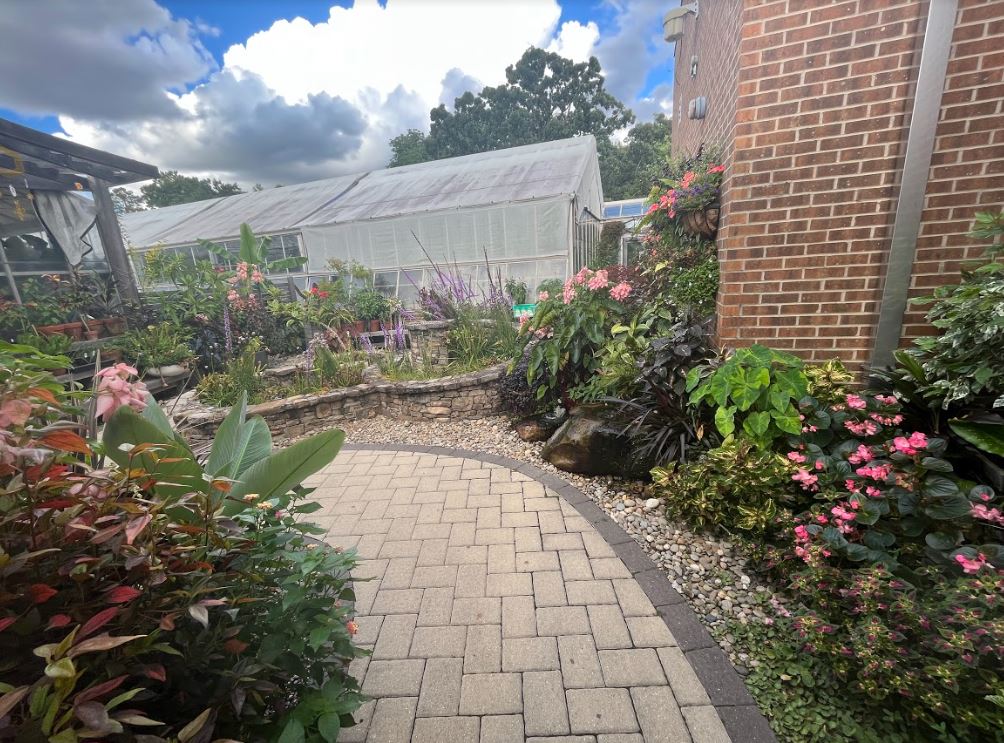
About North Carolina Humanities’ Grantee Spotlights: In celebration of our 50th anniversary, NC Humanities Grantee Spotlights shine a light on the incredible work of our grantee partners, offering details about their funded project, and feature a Q&A with a team member associated with the organization.
Photo Credit: The Carolina Garden Trail


